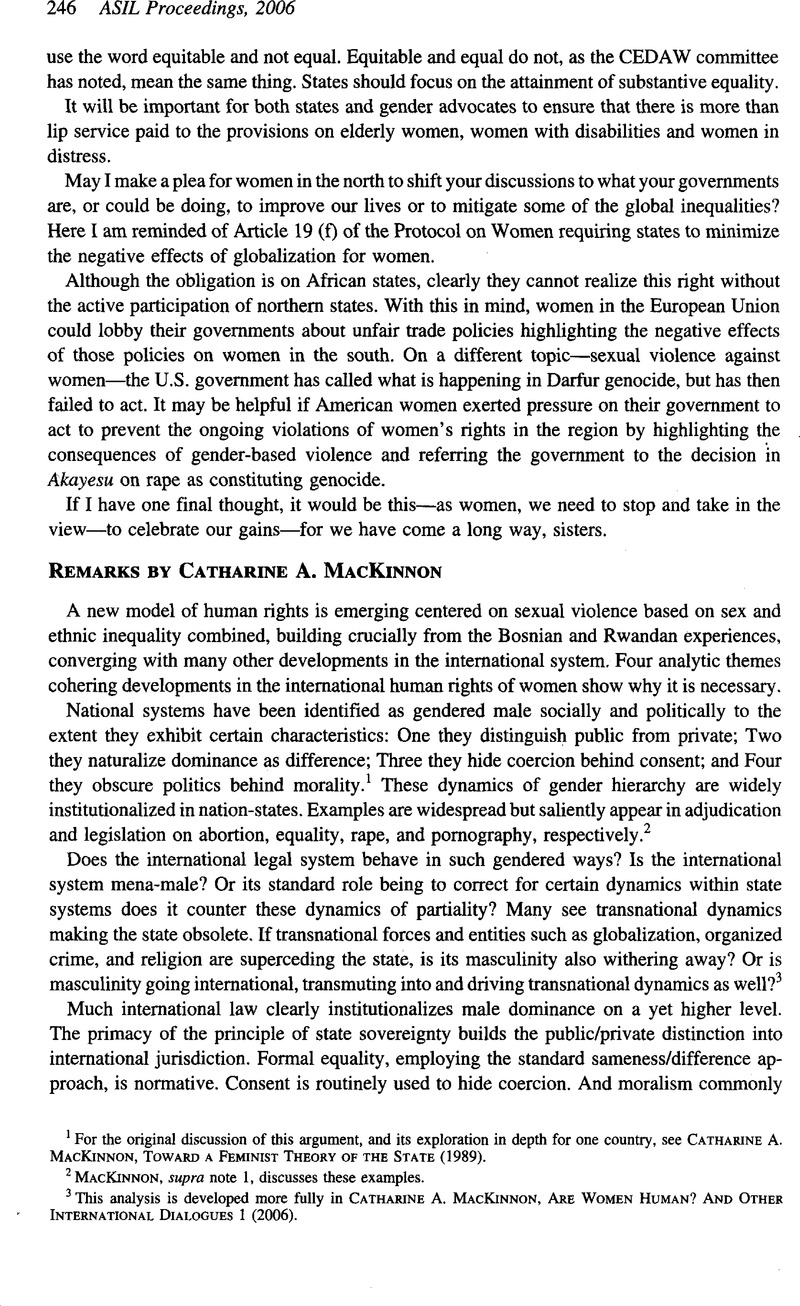Article contents
Remarks by Catharine A. MacKinnon
Published online by Cambridge University Press: 28 February 2017
Abstract

- Type
- Sex, Gender, and International Law
- Information
- Copyright
- Copyright © American Society of International Law 2006
References
1 For the original discussion of this argument, and its exploration in depth for one country, see Catharine A. MacKinnon, Toward A Feminist Theory of the State (1989).
2 MacKinnon, supra note 1, discusses these examples.
3 This analysis is developed more fully in Catharine A. MacKinnon, Are Women Human? and Other International Dialogues 1 (2006).
4 Kadic v. Karadžić, 70 F.3d 232 (2d Cir. 1995).
5 See Catharine A. MacKinnon, Sex Equality 24-35 passim (2001) (discussing Canada); effective January 1999, Sweden passed a de facto sex equality approach to prostitution, decriminalizing the prostituted people and criminalizing the purchase of people for sex. Act Prohibiting the Purchase of Sexual Services [SFS] 1998:408 (Swed.); see also Catharine A. MacKinnon, On Sex and Violence: Introducing the Antipornography Civil Rights Law in Sweden, in MacKinnon, supra note 3, at 91.
6 See, e.g., Human Rights Committee, General Comment No. 18, Non-discrimination, UN Doc. HRI/GEN/1/Rev.l, at 26, para. 7 (1994); Convention on the Elimination of All Forms of Discrimination Against Women (CEDAW) Committee, General Recommendation No. 19, Violence Against Women, UN Doc. A/47/38 (1993); CEDAW Committee, General Recommendation No. 23, Political and Public Life, UN Doc. A/52-38/Rev.l, pt. II, at 61, para. 15 (1997); CEDAW Committee, Report on Mexico Produced by the Committee on the Elimination of Discrimination Against Women Under Article 8 of the Optional Protocol to the Convention, and Reply from the Government of Mexico, UN Doc. CEDAW/C/2005/OP.8/Mexico, para. 34 (Jan. 27, 2005).
7 Prosecutor v. Akayesu, Judgment, No. ICTR-96-4-T, para. 688 (Sept. 2, 1998). See Catharine A. MacKinnon, Defining Rape Internationally: A Comment on Akayesu, in MacKinnon, supra note 3, at 237.
8 This refers to Butler v. Regina, [1992] 1 S.C.R. 452, 479 (Can.) in which the Supreme Court of Canada found that pornography “results in harm, particularly to women and therefore to society as a whole,” upholding a criminal law against it over a constitutional expression challenge on equality grounds. However, the law, being within the discretion of the state rather than in the hands of those harmed, has not been enforced effectively.
9 Prosecutor v. Nahimana, Barayagwiza, and Ngeze, Judgment and Sentence, No. ICTR-99-52-T (Dec. 3, 2003); see MacKinnon, Catharine A., Prosecutor v. Nahimana, Barayagwiza, and Ngeze , 98 AJIL 325 (2004)CrossRefGoogle Scholar.
- 1
- Cited by




